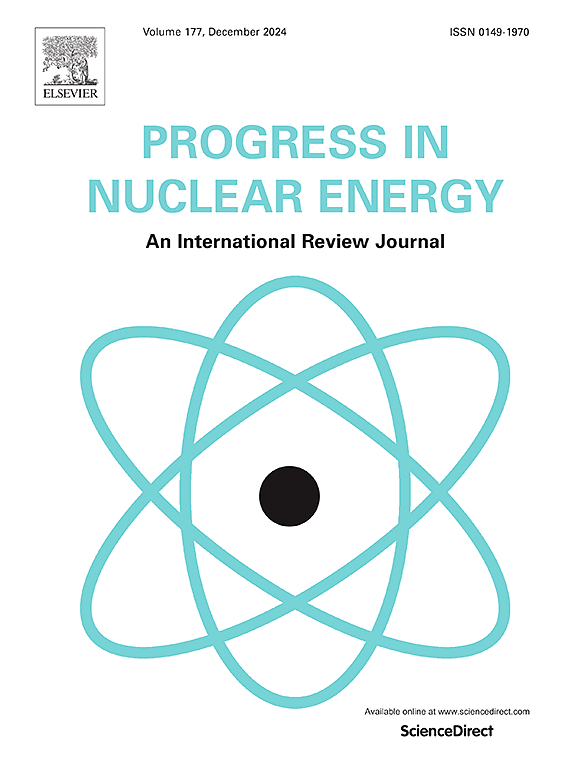可解释贝叶斯优化自编码器在核电厂故障检测与诊断中的应用
IF 3.2
3区 工程技术
Q1 NUCLEAR SCIENCE & TECHNOLOGY
引用次数: 0
摘要
核能作为应对气候变化必不可少的清洁能源,其安全稳定运行直接关系到能源可持续发展和社会安全。然而,核电站故障诊断面临着数据量大、故障数据稀缺、多参数关联复杂等挑战。为了解决这些问题,本文提出了一种可解释的贝叶斯优化自编码器故障诊断模型。该模型仅依靠正常运行数据,通过重构误差的突变来准确诊断异常,克服了传统方法依赖故障数据的局限性。通过贝叶斯优化对自编码器的超参数进行动态调整,增强了自编码器对复杂时间序列数据的适应性,提高了自编码器的诊断精度。此外,引入可解释的机器学习技术来量化关键参数对故障的贡献,提供对故障原因的清晰见解,并为后续工程干预提供科学支持。实验结果表明,该方法在核电站实际运行数据和仿真数据集上的故障诊断F1得分均超过95%,显著优于传统方法。此外,该模型能有效评估不同故障条件的严重程度,分析故障原因,显示出较强的实际应用潜力。本文章由计算机程序翻译,如有差异,请以英文原文为准。
Interpretable Bayesian-optimized Autoencoder for fault detection and diagnosis with application in nuclear power plants
Nuclear energy, as an essential clean energy source for combating climate change, is directly tied to sustainable energy development and societal safety through its safe and stable operation. However, fault diagnosis in nuclear power plants faces challenges such as large data volumes, scarcity of fault data, and complex multi-parameter correlations. To address these challenges, this paper proposes an interpretable Bayesian-optimized Autoencoder fault diagnosis model. The model relies solely on normal operating data and accurately diagnoses anomalies through abrupt changes in reconstruction error, overcoming the limitations of traditional methods that depend on fault data. By dynamically adjusting the hyperparameters of the Autoencoder using Bayesian optimization, the model enhances its adaptability to complex time-series data and improves diagnostic precision. Additionally, interpretable machine learning techniques are introduced to quantify the contributions of key parameters to faults, providing clear insights into fault causes and offering scientific support for subsequent engineering interventions. Experimental results demonstrate that the proposed method achieves fault diagnosis F1 scores exceeding 95% on both real-world operational data and simulation datasets from nuclear power plants, significantly outperforming traditional methods. In addition, the model can effectively evaluate the severity of different fault conditions and analyze the cause of the failure, demonstrating strong practical application potential.
求助全文
通过发布文献求助,成功后即可免费获取论文全文。
去求助
来源期刊

Progress in Nuclear Energy
工程技术-核科学技术
CiteScore
5.30
自引率
14.80%
发文量
331
审稿时长
3.5 months
期刊介绍:
Progress in Nuclear Energy is an international review journal covering all aspects of nuclear science and engineering. In keeping with the maturity of nuclear power, articles on safety, siting and environmental problems are encouraged, as are those associated with economics and fuel management. However, basic physics and engineering will remain an important aspect of the editorial policy. Articles published are either of a review nature or present new material in more depth. They are aimed at researchers and technically-oriented managers working in the nuclear energy field.
Please note the following:
1) PNE seeks high quality research papers which are medium to long in length. Short research papers should be submitted to the journal Annals in Nuclear Energy.
2) PNE reserves the right to reject papers which are based solely on routine application of computer codes used to produce reactor designs or explain existing reactor phenomena. Such papers, although worthy, are best left as laboratory reports whereas Progress in Nuclear Energy seeks papers of originality, which are archival in nature, in the fields of mathematical and experimental nuclear technology, including fission, fusion (blanket physics, radiation damage), safety, materials aspects, economics, etc.
3) Review papers, which may occasionally be invited, are particularly sought by the journal in these fields.
 求助内容:
求助内容: 应助结果提醒方式:
应助结果提醒方式:


